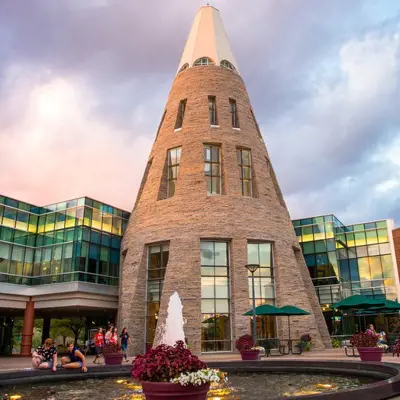
In the summer of 2021, USI welcomed a new department to campus—the Center for Adult Learner Success (CALS) officially “opened” its doors with the goal of making USI more accessible to those non-traditional, adult students—those who are 25 years and older, working adults, have dependents or have been out of college for more than two years—seeking their undergraduate or graduate degrees.
Three years later, the grant that made CALS possible, awarded through the Lilly Endowment, Inc., came to an end, but the University’s commitment to the students served by this department did not.
The beginning of CALS was thanks to a $2.5 million grant awarded in September 2020 as part of phase two of the Lilly Endowment’s Charting the Future for Indiana’s Colleges and Universities Initiative. Grant-funded positions were filled to staff the new center, including a director, intake and support specialists and a marketing manager. Over its three-years on campus, CALS collaborated with a network of existing structures within USI, including advising, admissions, marketing, academics, and others to identify, enroll and graduate adult learners, offering these students support to match their unique higher education journey.
As of July 1, 2024, CALS and Online Learning have been renamed to the Online and Adult Learning Department. “With nearly 71% of USI adult learners taking online graduate courses and 29% taking undergraduate classes, this renaming of the two areas seemed the best,” says Dr. Michael Dixon, Dean of the School of Graduate Studies. “There’s a lot of symbiosis and crossover between online and adult learning because online is the primary modality that adult learners are seeking,” he adds. “It’s just one of those things that makes sense.”
Currently, there are staff housed in Online Learning who are working with adult learners in both graduate and undergraduate programs to help them earn their degrees from USI. While there is a name change, Dixon emphasizes the mission will stay the same. “In terms of supporting and recruiting adult learners, nothing is going to change,” he says. “We’re still going to provide guidance, at the application and enrollment levels and beyond, to ensure the success of USI’s adult learner population.”
This renaming has been possible due to the successful infrastructure that those in CALS had created over the last three years. “The greatest success has been that dedicated infrastructure, which has been built to accommodate and support that unique adult learner population. That was something we did not have before the grant and CALS,” says Dixon. “It was one of the primary purposes of the grant itself, to build a department designed to eliminate the barriers or impediments that an adult learner coming back to or attending university for the first time may experience.”
This successful outreach has included the adoption of CRM software (customer relationship management) that opens up communication channels to adult learners that have never been used by USI before, as well as staffing dedicated support specialists whose primary responsibility is to work with adult learners and ensure they are receiving the guidance and assistance they need through all stages of their higher education journey. “Along the way, we’ve learned invaluable information, not just improving our understanding of how adult learners learn, but also what types of programming and courses they are looking for,” adds Dixon. “Our team of instructional designers have worked very hard with faculty members to ensure the programs meet adult learners’ needs.” That includes incorporating industry-based activities and outcomes to not only serve adult learners where they are but continue their education and help them beyond the completion of their degree journey.
Moving forward, Online and Adult Learning will collaborate with faculty to expand the portfolio of offerings to help draw further interest from the adult learner population. In the past three years, Dixon says there has been a modest increase in adult learners at the graduate level, and the goal now is to continue that increase there and at an undergraduate level too. With a strong infrastructure in place, he believes the interest and inquires the department has received from adult learners can transform into enrolled students. “The work that we and many others across campus have done over the past three years has been instrumental in ensuring the sustainability of support for adult learners. Now, we are continuing that collective endeavor to ensure long-term viability and success in supporting adult learners,” he says.
For more information about Online and Adult Learning, visit USI.edu/online-and-adult-learning.